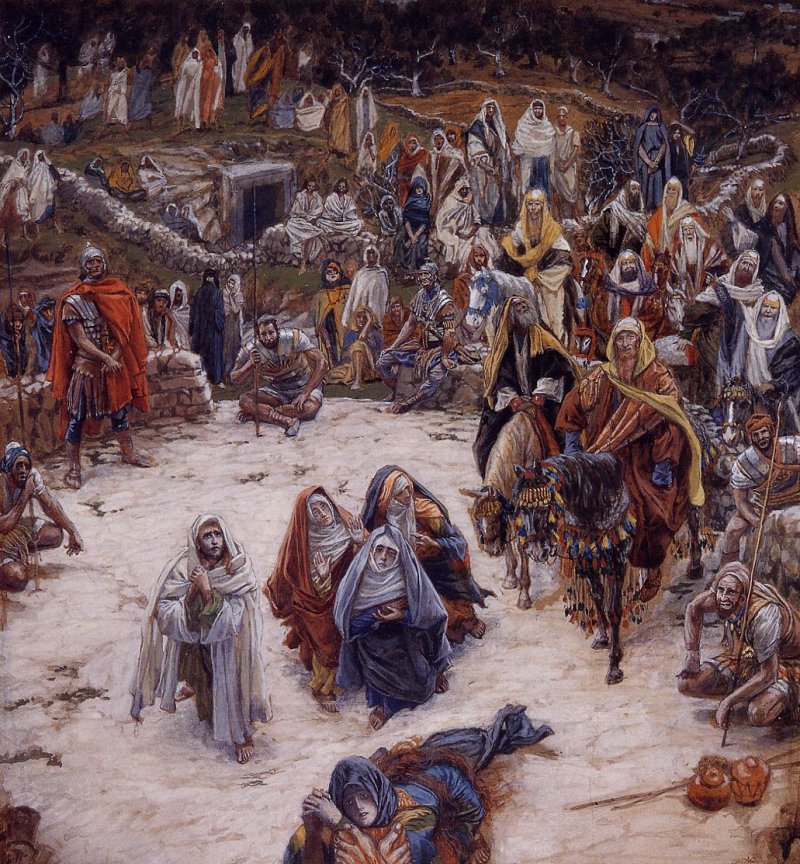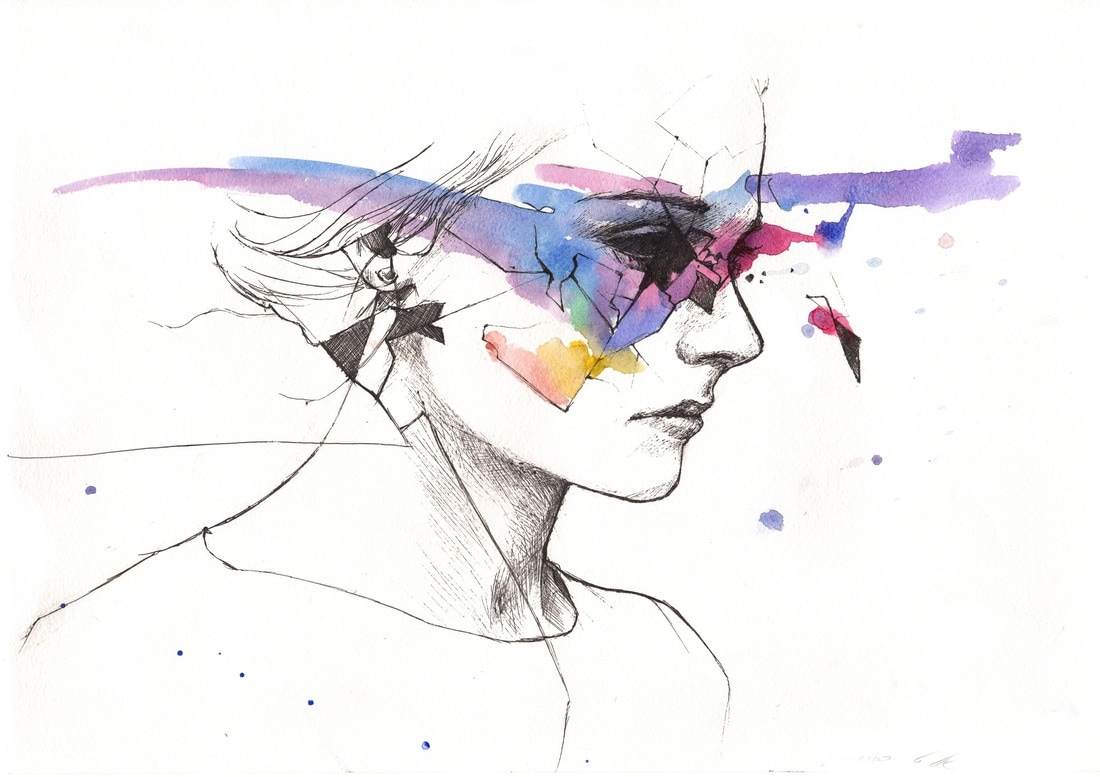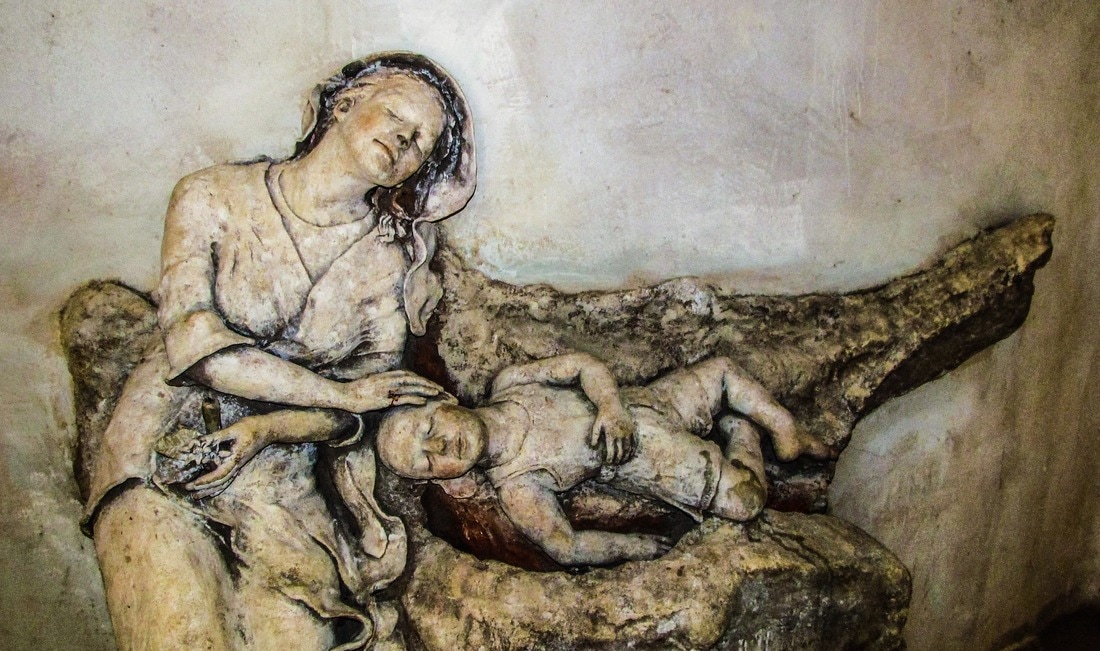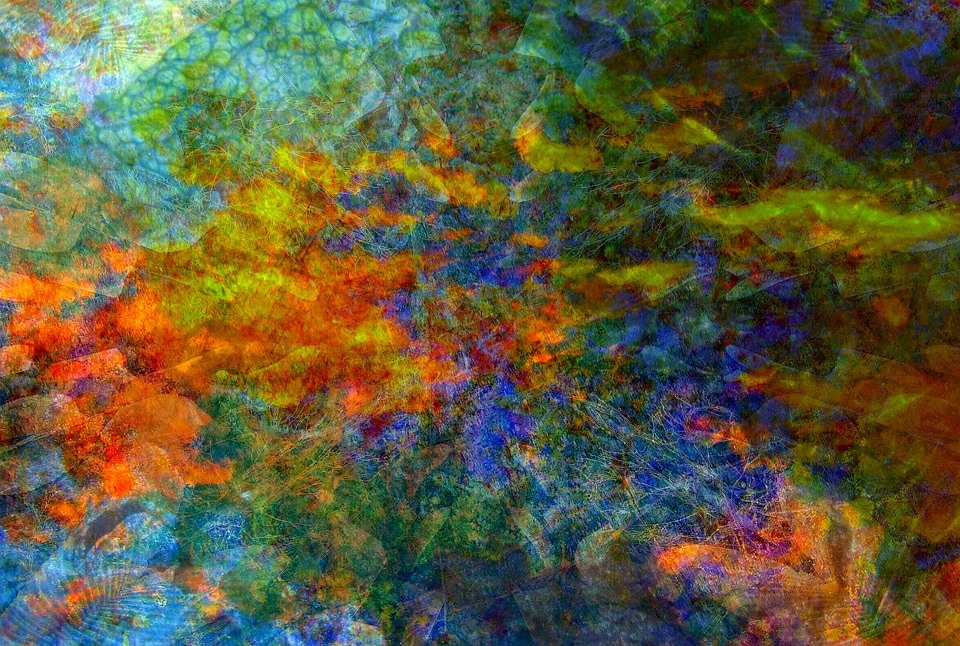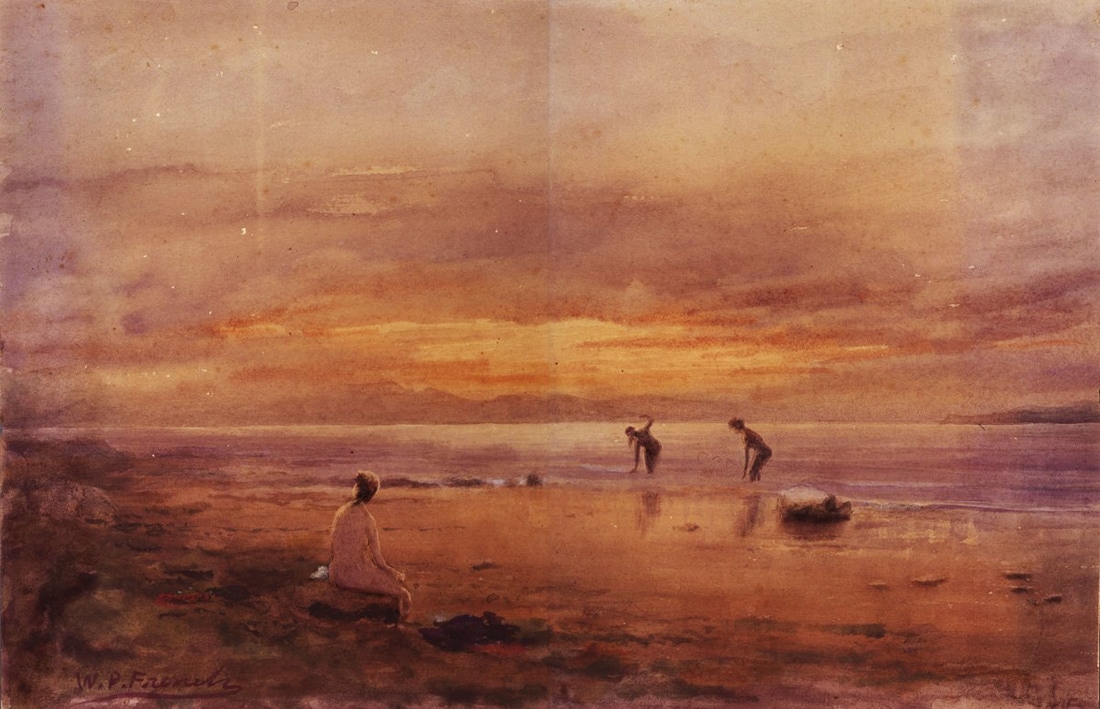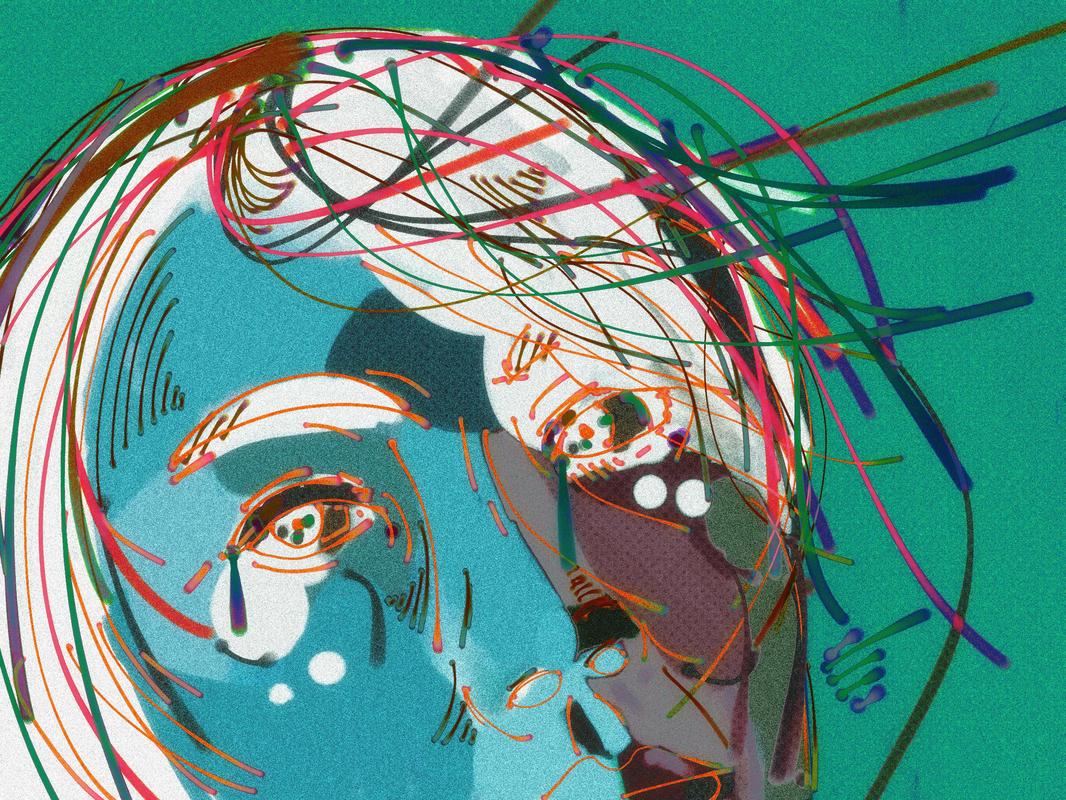|
As tears streamed down my cheeks, three faces stood looking at me with concern. The nurse, who had faithfully helped reposition me over and over again to help progress my labor in the passing hours, sticking her fingers inside me to help direct my pushing. My doctor, who had not once during my prenatal care said the word “c-section” and who now held my hand and told me the procedure did not mean I was a failure. And my husband, who for sixty hours had been by my side helping coach my breathing, hold me throughout bouts of uncontrollable shaking, and read scripture to remind me of God’s presence, and whose face now showed an undeniable mixture of fear and relief. I finally accepted the inevitable, recalling stories of friends who had tried to keep pushing only to find themselves dealing with additional complications.
I lay on the operating table, my arms stretched out and deep sorrow welling up in my soul. All of the questions about how I got there and whether it was really necessary came later. At the moment, all I felt was fear like I had never felt it before - and underneath it an emotional pain that made me completely passive. Undoubtedly the heavy doses of drugs were partially to answer for the utter surrender I found myself experiencing; but they did not explain it all. As I lay on the table, I realized I was truly and finally at the end of waiting for motherhood. My baby was going to arrive, but she would arrive in the most invasive and scary way I could imagine. And as the operating room chatter of doctors and nurses quickly indicated, even the details of my brightly lit, highly anesthetized delivery would not be easy. The baby was so stuck that normal procedure could not take place. As the tugging and pulling commenced and continued, I closed my eyes. In my heart I reached out to God and he met me. Story after story of broken women flashed across my mind. Through scripture, God reminded me of his closeness to women who suffer. I thought about Sarah. I thought about Mary. I thought a lot about the woman healed of bleeding. Lying on the operating table I felt unbelievably small. But it was in that smallness that God fellowshipped with me and reminded me of the ways he has seen the small, hidden things of female existence. Now more than ever I understood the suffering of women described over and over again in the Bible and as I was ministered to by the Holy Spirit, I loved the God who condescends to see us. The worst moment of the entire last nine months came at the very end. As they finally lifted the baby out of me, she did not cry. For an eternity I listened to doctors repeat questions and return answers about their efforts to invoke her cry. In reality this did not last longer than a minute, but that minute was fire through my brain. Everything about the last nine months snapped and all of my concerns about myself, about my identity, about my future were burned up with the overwhelming desire to know that my baby would breathe. In an instant I dropped every fear I had about what motherhood would do to me because all of those fears could not compete with the resounding thought that my baby was not okay. Until a kind nurse came to reassure him that our little girl had a good heartbeat despite the continued need for her to cry, my husband sat on the edge of insanity. But soon the cry came, and it came loudly. Verity Ann was born at 12:53pm on Sunday, April 30, 2017. As the doctors continued to stitch and medicate me, she was brought to my chest and I said, “Hello, baby.” She couldn’t stay long, though, and it was my greatest relief to send her daddy to watch as the nurses cleaned and assisted her. She was not alone. In the weeks since my daughter’s birth, I have dealt with myriad emotions. Against the backdrop of relief, I’ve doubted doctors, I’ve doubted myself, I’ve doubted the system - all to arrive back and back again at the belief that everyone did both what they could and what they should have done. In the end, what I have had to accept is not the I or someone else screwed myself over, but rather that I have a broken body. Despite everyone’s best efforts and even in the shadow of God’s providence, my daughter’s birth left scars on my body that will not be removed until the full redemption of all matter. My womb, which was not meant to be, was cut open and sewed back closed and this mark on my body that will not go away until the dust I’m a part of is remade again. I’ve seen a lot of women online speak of pride in their “battle scars.” I understand why women speak this way. It helps to bring honor to a process that easily feels like your biggest failure as a woman. I too feel like I went through battle and was willing to do whatever necessary to win, even letting my flesh be cut, pulled, and sewn in order to ensure victory. I too feel as if the scars left behind are a badge of my experience. But this term - “battle scars” - only reminds me that things are not as they should be. It’s a term that speaks to the sacrifice made and the victory I had, but also that all was not right to begin with. Battle is only something we enter into when something is broken, flawed. Just as the wounds of the soldier will one day be erased along with all bloodshed and war, so too the scars left behind by the battles women have faced in birthing. The dust of our existence will be renewed. “For he knows our frame; he remembers that we are dust” (Psalm 103:14). God has not forgotten who we are. Since her arrival, my daughter has brought me more joy than I could have possibly imagined. When I look into her eyes, when she smiles as she poops, when she sticks out her tongue in hunger, when her eyes finally close in sleep - all of these things are a new song for my soul. These and countless other things about her life and person. It amazes me how quickly this joy flooded my life. Almost from the moment she was born, her existence reduced the worry of other unhappy things going on. The long labor, the unfortunate c-section, the initial frustrations of nursing, the discomfort of the hospital, the sleepless nights all so easily and so quickly faded into the joy of life. Verity does not fulfill me. But her life makes me happy and it is something I love to celebrate every day. But I am not very good at writing about my joys. Words are hard for me when I turn to describing the things that make me happy. I wish so badly that I could find better ways to describe the joy I find in being Verity’s mother and in embracing her as my daughter. And I wish that I had known more of this joy during my pregnancy. Now that I know how happy it can be to have a child I wish I had celebrated her preparation every day. In the end, it is a matter of love. “There is no fear in love, but perfect love casts out fear. For fear has to do with punishment, and whoever fears has not been perfected in love” (1 John 4:18). How can I be afraid of motherhood when I love my child so much? How can I be afraid of change when God has given me so much? There is no punishment for me. I am free to love, and it is love that makes me brave. During one of our nights in the hospital I got up to go to the bathroom. It was the first night without the catheter, so I had to make myself walk despite the very painful incision and my abs that could barely support sitting on the toilet. I stood in the bathroom and thought about my beat up body. It made me feel very very small. I hadn’t felt that way since I lived in China. The only other time I have ever felt that small was during a bus ride across the vast expanse of a Chinese megalopolis. I sat by the window, looking out at thousands of people passing by, knowing they were only a small portion of China's billion, and I and my problems became small. I was lost among these people, invisible. And the small sufferings I faced living in their country were small indeed. But as I rode on the bus, I knew that while smallness most often means vulnerability, it can also mean hiddenness. On that ride I knew myself to be hidden in God’s hand. To be small can be frightening, but only if you are exposed, abandoned. When something small is hidden within something large, when it is sheltered and protected, it is not a terrifying position. Since becoming a mother, I have felt very small. But I am learning that is ok, because throughout scripture it is the small to whom the Lord promises to be near. The weak, the vulnerable, the scared, the hurt, the uncertain - these are the people who receive the promises of God. In the recent weeks, the birth of my daughter has given me the privilege of knowing myself included.
5 Comments
At Home, Cambridge, Massachusetts
Today has been a quiet, low kind of day. I’ve just been at home, working. It’s sunnier than it’s been all week, which of course makes so many things better. But I’ve been tired – physically tired, mentally tired, and emotionally tired. I don’t think it’s anything other than the tiredness everyone talks about experiencing this late in pregnancy. But I’ve been battling my demons in the midst of it nonetheless. The old and constant temptations have been on my mind – feeling like I’m not doing enough, feeling unsatisfied with what I am doing, worrying about whether I’ve missed and wasted my opportunities to do the things I do really love, etc. But I’m not giving into them. It’s too quiet and I’m too tired to give into them. It is ok if I am small. I don’t have to be great. God has been faithful to me over and over and over again, and he has directed my steps. Whenever I’ve experienced success in life it has come clearly from God’s direction, not my own. Even when I’ve worked hard for something, and received it, it has been clear that it was not my own doing, but God’s. So in this moment, when I’m tempted to believe that the dreams I have will never happen, that panic is the only option, I turn to Christ and remember that he has brought me this far – to unexpected places – and I can trust he will continue to take me where he wants. And it will be good. This will probably be one of my last entries and I wonder if I am any different today than I was when I started writing more than two years ago. Am I holier? Am I a better person? Am I more like Christ? Truthfully, I have to say no. I’m not and I know I’m not. The same sins of fear and doubt and selfishness that plagued me when I started continue to plague me today. I still fret and worry over who I am rather than living freely in my identity in Christ. I still flinch at any indication that I am not amazing, that I am not worthy of admiration. I am still vain and shallow and want things that are poison to my soul. I still need Jesus and I always will. But I do think I have learned something about peace. I wouldn’t go so far as to say that I am a more peaceful person. I still yearn to grow in this area. But perhaps I have learned something about peace – what it is and what it means. Peace isn’t happiness, and it isn’t a feeling. It isn’t optimism. Rather I think peace is a cessation of our striving. A knowledge that with God’s hand resting in benediction upon our heads, we can stop moving and be still. When I understand it this way, I know I am at peace with becoming a mother. I will continue to struggle with many things about being a woman and a mom, and I will surely repent again and again as I grow in grace. But the restlessness with which I started writing – the sense that I could only overcome my fears through a mighty exertion of myself upon the world – that is gone. Peace today, in this quietness, is an open-handed acceptance of where God has brought me and a cessation of my striving in the light of his blessing upon my head. Perhaps I will produce nothing more in my life and motherhood will be an end as much as it is a beginning. Perhaps God will continue to bless and utilize the gifts he has given me, giving me joy in my heart. Regardless, I will be still under his hand. I will accept the smallness such stillness requires. For he has been good to me. Always good to me. At Home, Cambridge, Massachusetts
Recently a friend sent me a recommendation for a book written against the natural child birth movement. I haven’t read it, but whenever in life I actually have time to do so I want to read it along with the book I keep hearing about from the woman who started the natural childbirth movement on a farm. I’ve become pretty intrigued at trying to understand how these women come up with their philosophical positions concerning childbirth. On the one hand, the natural childbirth movement argues that the process is totally natural and should be left alone. On the other hand, the doctor writing the book my friend recommended argues that pain is not natural, nor is it considered a human good; therefore, the pain of childbirth should not be considered natural and something to leave unmedicated. Suffering is not something people should view as “normal” or “natural,” and we should attempt to alleviate the suffering a woman experiences in childbirth. I find this ideological divide fascinating, particularly for what it says about the secular world we live in. Apart from an understanding of creation that maintains it was designed to be good, and apart from a belief in the fall and resulting curse of that which was designed to be good, I’m not sure how you would navigate the conundrum of childbirth. Apart from the seemingly Biblical idea that pain in childbirth is not natural, I think the natural birthers have the philosophical upper hand. Totally apart from the fact that the natural birthers only get to focus on the experience and believe the things they believe due to historical privilege (natural childbirth can only be romanticized the way it is given the availability of medical intervention for situations that go wrong and our dramatically low mortality rates compared with the rest of history), I think they are at least ideologically consistent in promoting the idea that women should not be afraid of something that is at its most basic level natural to their bodies. And yet, the natural childbirth movement is inconsistent in their idea of pain. Where else in life do people glorify natural pain – as opposed to chosen pain in order to achieve such as an athlete would endure – and make it meaningful and transcendent? To believe that everything about childbirth is totally natural, and therefore totally good, you are pretty much left with concluding that either women are the most screwed over biological entities on the face of the planet evolutionarily speaking, or that pain and suffering in childbirth is somehow the only place in the world we believe physical pain to be a holy, meaningful experience. If the pain and threat of childbirth is truly natural, then women are the biggest losers of the evolutionary game. If not, and we still want to maintain that childbirth should be left unmedicated for the natural spiritual experience it provides, might we not call it masochistic? Pain seems to be a reality that neither side of this debate really knows how to adequately grapple with. The natural childbirthers make it integral to the identity and substance of womanhood, accepting evolution’s luck of the draw and attempting to bequeath it with meaning. The medical system rightly understands that suffering should not be inherent to anyone’s identity and that in order to protect the dignity of women, it is good to prevent or limit the pain which can so easily reduce women to vulnerability and misery. Yet in the process, the medical world so often forgets and overlooks what is good and beautiful about childbirth – that in some shape or form it is what women were created to do. The medical profession, as represented by the doctor writing this book, equivocates childbirth and a broken arm in order to suggest we are foolish not to offer women medical intervention; but arms don’t naturally break and women’s bodies do naturally produce babies. Only the Biblical idea of fallenness seems really adequate to hold both realities together – that women’s bodies are made to do this thing and should be given room to make it work (natural childbirth) and that along with so many other things about our physical existence, childbirth is fallen and can do real, serious, and lasting harm to women, which we should try to prevent (medical intervention). More than anything else I can think of, childbirth stands at the crossroads between the glory and the shame of humanity. Only in childbirth do we catch such a crystal clear glimpse of what was meant to be – the power and strength of humanity exerting, maintaining, and producing life. And only in childbirth are we confronted with the futility and misery of life severed from fellowship with God, smashed into the fragmented remains of his image. For both woman and child, birth is a beautiful, glorious, God-imaging moment that cannot escape from the confines of suffering and death, no matter how much we try to convince ourselves of its transcendence. Oh the beautiful, breathtaking mystery of the incarnation and the redemption it ushered in. The glorious marvel of Jesus is not only that the incarnated Son of God suffered death, but also that he suffered birth! How often do we contemplate the mysteries of the incarnation, marveling at Christ’s embodiment without thinking about his birth. His birth was not romantic and transcendent for Mary; and this is not because it was in a manger, but rather because it was just like every other birth. It involved the same mundane, banal pain that every woman and every baby has felt since Eve. The mystery of the incarnation not only involves the mystery of Jesus’ smallness; it involves the mystery of the God of the universe experiencing the banality of birth itself, since what was intended for glory can only ever offer pale reflections of the original design once it is fallen. In the cross Christ paid for sin. In the resurrection Christ finished death. And in his birth Christ redeemed the very idea of life itself. At Home, Cambridge, Massachusetts I watched this video today and wept. I’m crying inside over the Women’s March and I’m crying inside over the anniversary of Roe v. Wade and I’m crying because I see so few places for women to turn to discover beauty. Though I don’t begrudge anyone for going to the march, I just can’t find in it the beauty creation promises. It offers togetherness and unity, but demands the price of glorifying a shattered and broken image of womanhood. Is performative political posturing the best we really have to offer women? It doesn’t matter how many women scream together. If what they scream is empty then beauty won’t be found there. You can collect a million shattered mirrors and still only see a fractured and dim image of what is supposed to be. Control is what the world wants; control is what women want. The promise the world offers is that through power, women will finally gain control over the chaotic dissonance of their earthly bodies. As long as this is what we believe, true community between mother and child, between the generation that produces life and the generation that receives it, will be lost. Wholeness – the pushing back of the chaos of the womb – begins not through autonomy, but through community. It is only through the promise of the gospel, the restoration of creation, that peace can be found between my body and the life that it was created to produce. At Home, Cambridge, Massachusetts
Oh my goodness. I just read a woman’s post on the baby app about her baby boy who was born with severe birth defects. He lived for only 20 minutes before passing away. Her feed had his sonogram pictures and the pictures she took immediately after his birth in the hospital. It was too much emotionally. I start sobbing. These stories are always heartbreaking, but reading them while expecting and with all of these hormones going through me, I thought that I was going to pass out. The emotional weight of it was too much. I had never heard of the whole “rainbow baby” thing until starting to follow this app. For the longest time I couldn’t figure out what all of the rainbow emojis were for, but once I did figure it out, the weight of them really hit me. It’s chilling how many women use the emoji. Oh our broken world! What a sad place the world sometimes is. The weak and vulnerable are truly that in this world – too small and too fragile for those who are strong to know how to protect and preserve them. The small things are the most easily neglected, forgotten, trodden on. But we serve a God who became small. The biggest thing became the smallest thing, the weakest and most vulnerable. His birth was the ultimate rainbow – the sign to this world that the destruction of the small and fragile will not go unnoticed, will not go forgotten. The suffering that has been hidden by its smallness will be revealed, and then justice and redemption will arrive. 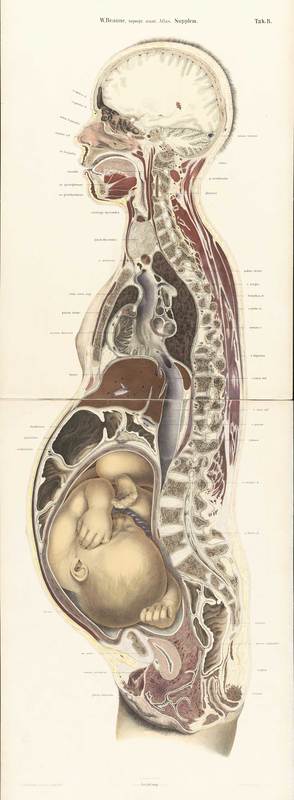 At Home, Arlington, Massachusetts Oh, my mother Eve, why did you bring this chaos into my body? I woke up this morning discouraged and sad, crying from being so overwhelmed with the physical reality that is procreation. And now I just feel this huge, gulfing grief as its full meaning and reality sinks into my consciousness. Things did not have to be these way. Things were not supposed to be this way. Eve, my sister and mother, why did you do this? The effects of your decision, of your sin, hurt in my body. They hurt every day. What should be rejoicing is not – it is the slow grind of nausea, and soreness, and exhaustion. Even the production of life is tainted by the pain which only death brings. In this world, for life to go on, life must be sacrificed. This is the consequence of my mother's actions. The female body is a place of chaos. Once Eve let it in, everything we have striven for is to reduce the effects of chaos within ourselves. Attempts to conceive, attempts not to conceive, attempts to live through childbirth, attempts to ease the pain of childbirth, attempts to understand it and to study – all of this has been woman's collective attempt to regain what was lost in Eden. Just as the apple entered into Eve's stomach, blood stream, and very physical reality, so too did the chaos of separation from God. Many people speak of the brokenness of sin, but let's not forget that brokenness looks and feels like a chaotic mess. A day is coming, though, when the chaotic work of women will be finished. Just as Eve’s digestion of the apple symbolizes the real reality of sin, so too does our digestion of the bread and blood symbolize for us the real reality of Christ’s redemption. Eating is central to our spiritual reality, for it is central to our very lives. Eating, holy and unholy, in the Biblical narrative reminds us of the physical parameters within which we understand both our fallenness and our redemption. Matthew 22:30 says, "For in the resurrection they neither marry nor are given in marriage, but are like angels in heaven." I used to find this passage overwhelmingly sad and I have cried many times to Trey about it. But it is only sad when read according to our post-Victorian romantic sensibilities. It's only sad when marriage is fundamentally about your own self-fulfillment. When it is read through the lens of Genesis 1-3, with an eye to the notion that marriage implies expansion, work, procreation – the establishment of something – then this pronouncement by Christ tells us, "It will be finished." The time of marriage as an act of creation will come to end, and with it, all of the chaos of this fallen reality. My painful work to produce life here on earth will be fulfilled and will be closed. I will not be subject to this chaotic reality for eternity – a change is coming. Eve, the Lord will redeem you. He will redeem your bloody and cursed decisions; he has already redeemed your eating. He will redeem the passing on of such evil through all generations even unto my day. You ruined everything; God will restore it. And I very much look to that day with anticipation. At Home, Arlington, Massachusetts
Well. I'm pregnant. After years of complaining, processing, and thinking about this, here it is. I'm not even sure I comprehend it. Out of nowhere, with no expectations, I'm pregnant. Last week, before I knew it to be a reality and only suspected it, I was peeking around the corner at awe. But this week, now that it is reality, all I feel is the physicality of it. My head hurts, my stomach is weird, and I have never ever felt more fatigued in my life. It's hard to think about awe when your body feels like it's crumpling from within. It is an awe-full thing. It ended up being so easy and so natural – not hard at all. Life taking its course in the most literal of meanings. And that is terrifying. Most of all, I simply find myself once again being scandalized and terrorized by the goodness of God demonstrated in it. God does not scare me when I believe him to be stern or demanding; but, I find him to be absolutely harrowing when he blesses me abundantly. How can such a great God deign to see me? Why would he do such a thing? It is his goodness that slaps the defiance off of my face and leaves me feeling naked and afraid. A God who withholds seems to give me space to raise a fist. A God who freely gives can only be met by my complete submission. For more than two years, I have believed that I was doomed. Maybe I still will be. Maybe I will miscarry and will get the woe I so often believe is rightfully mine. But right now, as new life begins to grow inside my tummy, I feel God laughing at me. Not mocking me, not spiting me, not even shaking his head at me. Just laughing for the joyful mirth of proving my countless wayward doubts wrong. Laughing as a Father laughs with joy over the blunders of his child. Laughing in love. The last three weeks have been some of the most chaotic and miserable of my life. But it feels as if a note has been struck, and its ringing in the air both creates and demands a silence within my heart. Be quiet. Be quiet now. The ripples of this moment will spread forth in waves, but this is a moment of silence. This is a moment to let life lie as it is, to stop, to let be. The Lord is good. And he sits on his throne in heaven. Amen. (Image by Percy French, "Mayo Mermaids.") At Home, Arlington, Massachusetts
"'But, Sister, you will follow me soon. You don't think any mortal life seems a long thing to me tonight? And how would it be better if I had lived? I suppose I should have been given to some king in the end - perhaps another as our father. And there you can see again how little difference there is between dying and being married. To leave your home - to lose you, Maia, and the Fox - to lose one's maidenhead - to bear a child - they are all deaths. Indeed, indeed, Orual, I am not sure that this which I go to is not the best.' 'This!' 'Yes. What had I look for if I lived? Is the world - this palace, this father - so much to lose? We have already had what would have been the best of our time. I must tell you something, Orual, which I never told to anyone, not even you...' 'What is it?' said I, looking down at her lap where our four hands were joined. 'This,' she said, 'I have always - at least, ever since I can remember - had a kind of longing for death.' 'Ah, Psyche,' I said, 'have I made you so little happy as that?' 'No, no, no,' she said. 'You don't understand. Not that kind of longing. It was on happy days when we were up there on the hills, the three of us, with the wind and the sunshine... Where you couldn't see Glome or the palace. Do you remember? The colour and the smell, and looking across at the Grey Mountain in the distance? And because it was so beautiful, it set me longing, always longing. Somewhere else there must be more of it. Everything seemed to be saying, Psyche come! But I couldn't (not yet) come and I didn't know where I was to come to. It almost hurt me. I felt like a bird in a cage when the other birds of its kind are flying home. '...The sweetest thing in all my life has been the longing - to reach the Mountain, to find the place where all the beauty came from... '- my country, the place where I ought to have been born. Do you think it all meant nothing, all the longing? The longing for home? For indeed it now feels not like going, but like going back. All my life the god of the Mountain has been wooing me... I am going to my lover. Do you not see now-?'" ~~~~~~~~~~~~~~~~~~~~~ I am rereading C.S. Lewis's Till We Have Faces and I've just read the above passage. There are probably no words out there that better describe how I have felt about my life for as long as I can remember. It's not morbid and it's not dark, but I've longed for what Psyche describes for so many years, and it has always been when I am happiest. When I am sad or depressed, I become controlling and feel the need to try to make everything right. But when I am happy, I am ready to be away. Ready to be home. It is the beautiful things in life that often feel the most unbearable. They are all shadows. Last night Trey and I had the most perfect sex we've yet experienced. It was everything I could have ever imagined sexual intimacy being. But if I was given the opportunity to leave now and enter into eternity, I would take it. The beauty of last night makes me ready because I know last night can't be repeated. It was good and whole and perfect – it was release from desiring something better. Now that I've tasted it, I feel satisfied and satisfaction is the end of things, not the beginning. In the above passage, Lewis states a truth that he seems afraid to understand, or at least to state in his other writings on the topic. Sehnsucht is in reality a longing for death. It is a desire for what cannot be obtained in this world when we are confronted with what the world has to offer. Lewis is indeed right when he says that our desires are too small. But if we desire aright, how can that desire be contained by this world? To desire what this world cannot offer is to desire that which requires my departure from this world. I am crying as I write this, but I am not sad. I simply am longing. And that longing aches so greatly. God, I know that, I, as a child of the promise, have you now, here. But I do not have the redeemed world yet. I do not have heaven – complete unity with you. I am still tied down by all of these things around me and when they are good, when they are everything I could ever want them to be, they only make the ache worse, because they only refresh the longing for everything else to be as right as they are in that moment. When Lewis says that marriage, and the loss of virginity, and the bearing of children are all a certain kind of death, I wonder how much he knew he was right on the subject. Did he accidentally stumble upon a truth all women known within their souls? Or did he understand the depths of this statement? Death involves the taking away of life, and for a woman much about the experience of creating life comes through ending some part of her own life. She does not become a wife without giving up independence. She does not become sexually active without being invaded. She does not become a mother without physical destruction in her body. But these all offer life, living, being alive as a result. I have now experienced two of these three things, and I hope soon to enter into the final and third. Might I see in these the same longing for death that Lewis describes with sehnsucht? In each of these experiences, am I not entering into a greater good, a better reality through that which is a kind of death? God, have you created woman so that what she longs for now requires in some parts her negation? Is the pattern of this fallen world so much replicated in my lived reality? When I receive the most good, I long the most for heaven. When I receive the most good, I am the most ready to bear children. But ultimately, to attain both requires a death within me. (Image by Surian Soosay, "Alternate Mother Nature, Internatal Internet.") At Home, Arlington, Massachusetts
“The opposite of the ‘One Child Policy’ is not the ‘Two Child Policy,’ but ‘Free to Birth.’ When I think about it more deeply, we are no more better than our parents when celebrating the replacement of the ‘one child policy’ with the ‘Two Child Policy.’ We may not be affected by the national policy, we may have more choice to deal with it (many of our friends went abroad to bear their second child), but we are deeply affected by the values of the world — parenthood should not degrade my living standards, my financial standards, or my standards of freedom — because we are still afraid of losing comfort, pleasure, or something that gives us identity. We are still making the choice in the fear.” I'm editing J.’s blog post for the CP on China's switch to the two-child policy and am incredibly convicted. He basically just tells stories from life about the policy, but he ends by discussing the way Chinese don't care about it anymore because no one wants to have kids anyways. His words above are as equally applicable to me in the West as they are to the Chinese. Lord, forgive me. I am making my decisions out of fear. I am no better. I am afraid of giving up my comfort, my financial security, my time, my independence. But parenthood isn't a degradation of these things and we shouldn't see it that way. I shouldn't see it that way. Please God, forgive me, and change my heart. Help me to see the beauty there is in your world, in the way you made me, in parenthood. Please help me to be more compelled by your design and your definitions of beauty than those which the world tells me are beautiful. Amen. At Home, Arlington, Massachusetts
Today was so good. The Lord provided so abundantly for Trey, and I couldn't be more proud of him and thankful to God. Trey got top honors in his graduating class from Gordon-Conwell. On one level, I'm kind of frustrated with him because of how much he always talked as if this was just not a possibility. But that's only a very small part of me. Most of me is just really happy. And really really relieved. I know everything would have been good too if he had not received this honor, but I've been praying practically the entire time we've known each other for him to excel, not for his own merit, but for the blessing I think he will be to others. I believe in the work he wants to do and his fitness for it. But since we got home, I've been feeling anxious again. I don't really know why, but as I was driving around doing errands today, it occurred to me that sometimes God's blessings are scarier than his discipline. I know this is twisted, but when the Lord blesses us, I often feel like asking, "When is the shoe gonna drop?" When is God going to call in the debt and discipline us? So many people I know believe that suffering is integral to the Christian life – and a necessary fruit of the Spirit. I know the Spirit is at work in me, so when is the hit coming? Most of the time, I find myself assuming it will come in the realm of our family. We won't be able to have kids. The kids will be a disaster. There must be something huge and horrible in my life; it can't all be blessings. I know this is faulty thinking, but it is so deep down in me that I don't know how to change it. God’s blessings scare me because they render me powerless and defenseless. They remind me the scales cannot be balanced - there is a debt, but is infinitely tipped in one direction, forever to remain so. I don't know why God ushers some into suffering and others into blessing. But I do know I want and need to learn to accept the goodness that God freely extends my way. |
About the ProjectThis is a very personal project. It tracks my growth and development as I journeyed toward motherhood over the recent years. It doesn't document every experience I had, and probably neglects my more joyful and peaceful moments in the frenzy of trying to communicate my fears, anxieties, and doubts. If you are a friend or loved one, please do not let anything you read here overshadow what you know of me personally. If you are a stranger, please remember that a living and flawed person stands behind these words. To all my guests here, please understand these are not political statements and try to extend me grace, even as I share my failures and foibles - I have repented of much of what I share. I don't share this journal as an exemplar, but rather out of the desire to share my hope that entrance to motherhood does not need to be a fearful thing - despite the very real fears I have fought against. Motherhood is simply a part of life and one through which I am discovering more of myself and my God. Archives
May 2017
Categories
All
|
